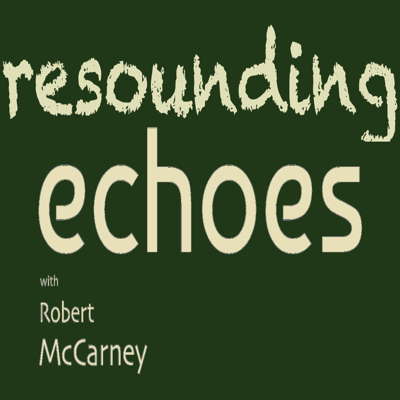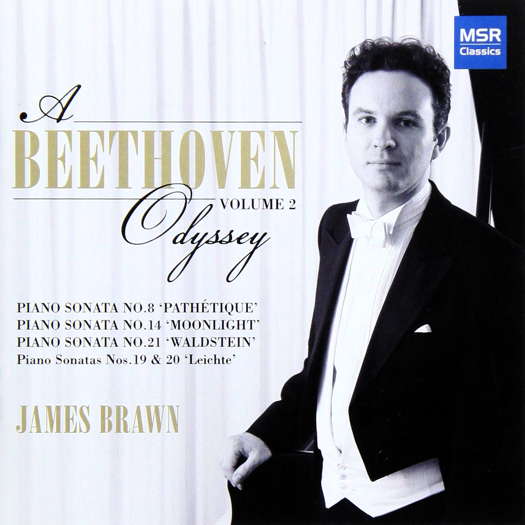- Masetto
- Classical music gestures
- Regent Records
- Tardebigge
- miscellaneous articles
- Israel Baker
- Sergei Taneyev
- Johann Wilhelm Wilms
Sex and Power in Pesaro
GIUSEPPE PENNISI reports on
a new production of 'Semiramide'
at the Rossini Opera Festival
Sex and power is the main theme of Semiramide, the first offering of the 2019 Rossini Opera Festival (ROF). The second opera is Demetrio e Polibio, composed by an adolescent Rossini to a libretto featuring a love story with thrones, deposing and recognitions. Finally, the third opera is L'equivoco stravagante, a comedy with so many sexual innuendos and double meanings that after only three performances in Bologna, the Board of Censors forbade any further staging.
The fortieth Rossini Opera Festival started on 11 August 2019 at the Vitrifrigo Arena in Pesaro. I was in the audience. The inaugural opera was Semiramide, a new production, and the third since the Festival began in 1980.
Semiramide is the last opera Rossini composed on commission from an Italian theatre: La Fenice in Venice, where it had its debut on 3 February 1823. Semiramide is also one of the very few Rossini opera seria that was performed, although often in mutilated versions, throughout the nineteenth century. This was mostly due to two singers, the Marchisio sisters, a soprano and a mezzo/alto, who were the protagonists of important productions in Paris and elsewhere, including the inauguration of the newly built Teatro dell'Opera in Rome.
Semiramide is an opera of Wagnerian size. The first act runs for 140 minutes, even though there are only seven musical numbers, in addition to the overture. The second act lasts 120 minutes and has six musical numbers. Each musical number is a scene, even when it includes only a recitative and an aria or a duet. The orchestra has a major role, more important than in many operas of that period, including others by Rossini. The employment of the orchestra is luxuriant and requires a large size ensemble where the instrumentalists are all very skilled and accustomed to work together.
The Rossini Opera Festival and the Rossini Foundation carried out a major philological work to reconstruct Semiramide as originally conceived by the composer. It is as a grandiose work, even more opulent than those conceived by Gaspare Spontini for the Emperor of France and the King of Prussia. The present production is a joint venture with Opéra Royal de Wallonie-Liège, where it will be seen and heard next year.
The libretto, by Gaetano Rossi, is based on a Voltaire's tragedy. The plot is, at the same time, simple and complex. Queen Semiramide (Salome Jicia) killed her husband Nino fifteen years before the opera starts. Her partner in the homicide was General Assur, then her lover (Nahuel di Pierro). Assur hoped to marry the Queen and for this reason made Ninia (Varduhi Abrahamyan), her son with Nino, disappear. Semiramide never married Assur, but she is attracted by a young general, Arsace: neither the Queen nor the young man know that he is actually Ninia. However, Arsace is in love with the Princess Azema (Martiniana Antonie) who, in her turn, is wooed by the Indian King, Idreno (Antonino Siragusa). Things get messy. The High Priest Oroe (Carlo Cigni) prevents the incestuous marriage between Semiramide and Arsace as well as the ambitions of Assur to become King. After a number of complications, Arsace learns that he is Ninia. He tries to kill Assur, who had murdered his father, but in the darkness of Nino's mausoleum, he stabs to death his mother, Semiramide. Thus, it's a very tragic affair where sex and power are the key elements: Semiramide and Assur killed Nino both for their sexual anger and for reaching absolute power; fifteen years later, Semiramide plots to go to bed to a man twenty years younger than her; everyone is interested in Azema; and so on.
The production is as grand as it ought to be. The real protagonists are the conductor Michele Mariotti, now an international star, and the National Symphonic Orchestra of RAI, the Italian State Radio and TV company. Not only, as said earlier, is the orchestration a key element of the opera, but Mariotti and the orchestra made it dazzling and moulded skilfully with the vocal part. Also, Mariotti gave cues to the singers so that the opera flew very well for almost four and a half hours, including an intermission. He underlined dramatic effects by slowing and speeding up the tempi.
Semiramide is an opera where women's voices dominate; it remained in the repertory primarily due to the two sisters who interpreted the Queen and the young general. We had two splendid voices. Soprano Salome Jicia is well known, and a few months ago this magazine reported her success at the Florence May Festival as the protagonist of Bellini's La straniera. Armenian mezzo/alto Varduhi Abrahamyan was a real revelation to this reviewer. I had heard her in concerts at the National Santa Cecilia Academy but I was stunned by her dramatic and vocal abilities in a hard trouser role. Especially impressive were their duets, particularly the highly dramatic one in Act II.
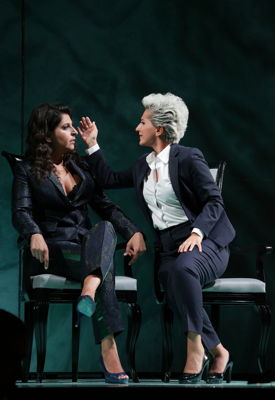
Varduhi Abrahamyan and Salome Jicia in Semiramide at the 2019 Rossini Opera Festival. Photo © 2019 Studio Amati Bacciardi
Nahuel di Pierro has the right Rossinian bass-baritone touch, and Antonino Siragusa is a well-versed and experienced Rossinian high texture tenor. Martiniana Antonie is a good light soprano and Carlo Cigni an authoritative bass. The chorus of the Ventidio Basso Theatre, led by Giovanni Farina, was effective, but in this opera it does not play a role such as in the operas of Rossini's Neapolitan period.
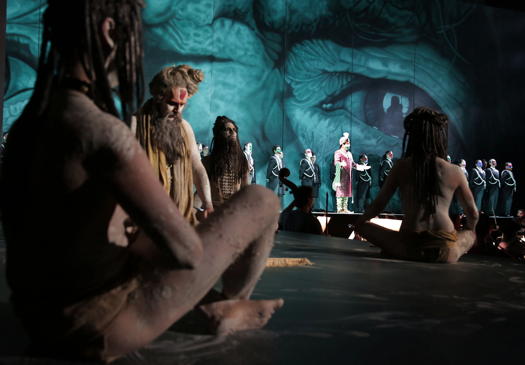
A scene from Rossini's Semiramide at the 2019 ROF featuring Antonino Siragusa and members of the Ventidio Basso Theatre Chorus, with the eyes of the murdered King Nino as backdrop. Photo © 2019 Studio Amati Bacciardi
In 1992, the Rossini Opera Festival's first production of Semiramide was quite traditional and was appreciated by audience and reviewers; the director was Hugo De Ana. In 2003, the second production (directed by Dieter Kaegi) was quite controversial as the plot seemed to develop in Star Wars-like outer space. In this third production (directed by Graham Vick, with sets and costumes by Stuart Nunn, and lighting by Giuseppe Di Iorio) there only a few references to mythological Assyria. The sets and costumes are timeless. The shadow of the murdered King Nino is always on stage.
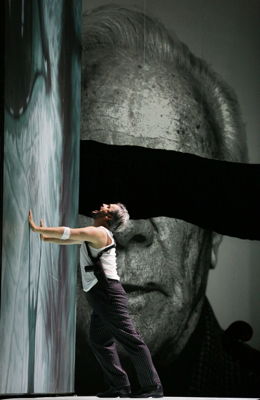
Nahuel Di Pierro in Semiramide at the 2019 Rossini Opera Festival, with the murdered King Nino behind. Photo © 2019 Studio Amati Bacciardi
It is a real drama of sex, power and ambiguity: for instance, both the Queen and Arsace wore contemporary black suits on high heels to underline gender ambiguity and the Act II duet, when Assur attempts to start again a sexual relationship with the Queen, develops on the couch of a modern living room. The psychology of the characters is explored well. The ancient tale becomes a very tense action of our own times. I appreciated the production but it is fair to say that not everyone in the audience did.
There was warm applause after each number, and accolades to the company at the end. Mariotti, Jicia and Abrahamyan received ovations. The production's 'creative team' received applause mixed with boos.
Copyright © 13 August 2019
Giuseppe Pennisi,
Pesaro, Italy



